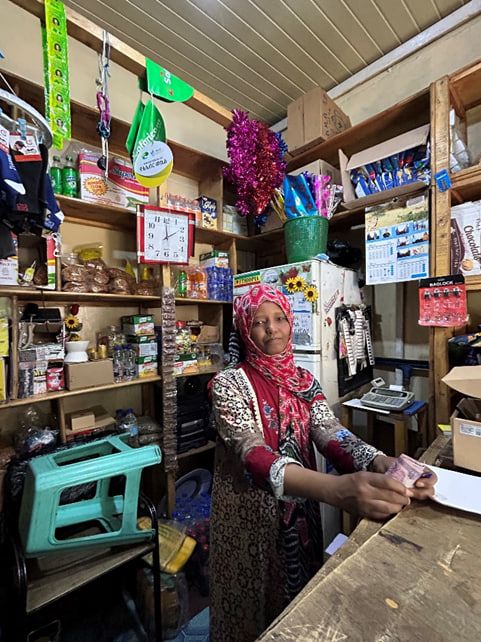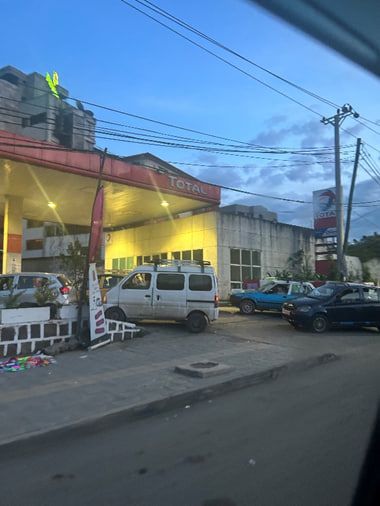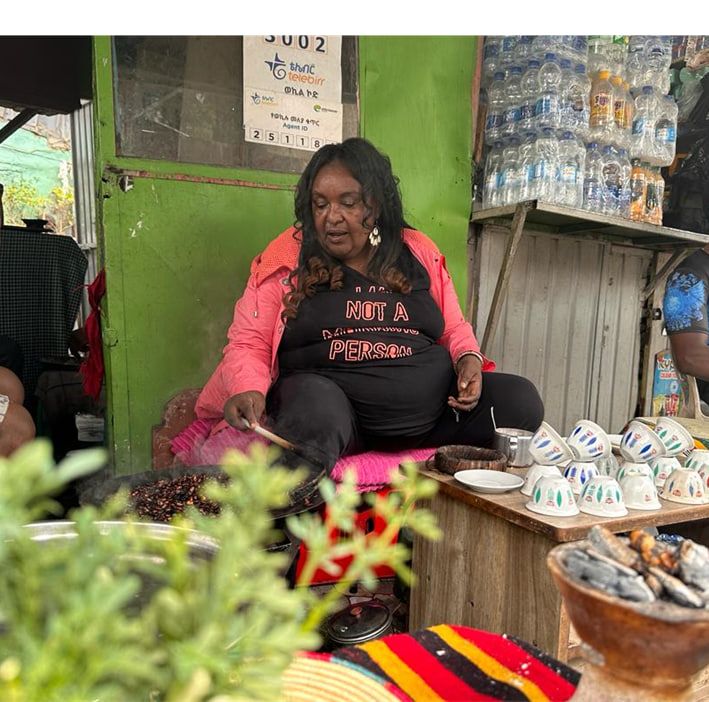Progress for 0 ad
Progress for 1 ad
Progress for 2 ad
Progress for 3 ad


Team Shega
Addis Ababa, Ethiopia

By Endashaw Tesfaye & Ariel Delaney
Recently, we met with ‘Emu’ and ‘Roman’ (affectionately known as ‘Mommy’). Both of whom are telebirr agents. They started offering mobile money services with the focus of sustaining their businesses. Emu is a mother of one running a retail shop in the middle of the Piasa neighborhood of Addis Abeba. She inherited the shop 20 years ago from her mother, who also ran it 20 years prior. The retail business is challenging, and Emu’s son is not interested in taking it over. Emu became an agent five years ago for Hellocash service with Wegagen bank. The service was based on Unstructured Supplementary Service Data (USSD), and with the basic training provided by a super-agent, she quickly started delivering mobile money services. “My phone was a ‘feature phone’ which made it easy for me to adapt to the service. I moved my airtime money as an initial deposit to run the new business, both mobile money service and selling airtime.”

This adoption didn’t come without hurdles. Emu was struggling with the lack of working capital for her business and the float (balance of e-money) needed to maintain for serving her Hellocash clients. She recently become an agent for telebirr, which requires a smart phone, and began building new digital skills to operate her new product. She took a one-week telebirr training. Unlike her first-time agency banking when she learned on her own by writing the steps out, Emu required additional assistance with telebirr. She eventually managed to operate the system on her own by navigating through the smart phone and the telebirr application (app). She practiced by making small transactions with relatives to build her confidence to provide telebirr services.
In Ethiopia, there are multiple service providers of mobile money like Emu that are operating in both urban as well rural parts of the country. Even though, the service was launched just over two years ago, telebirr, has showcased a good use to Micro, Small and Medium Enterprises (MSMEs) in Ethiopia, and has taken the country by storm. A wide range of MSMEs have joined the network of service delivery by becoming agents of the service to serve their communities.
As mobile money agents, women agents provide a more trusted environment for women to make transactions, even though they also face operational and safety concerns. This is not the first time that businesses in Ethiopia, mainly in the capital- Addis Abeba, witnessed such services and merchants becoming agents. However, the scale was different, and now telebirr is becoming a household name and is being used regularly.
“I have a good relationship with someone from the company (telebirr) that introduced me to the service where I can call the coordinator for different challenges I face in running the business. Not only questions around how to provide the service but with liquidity issues that I face from time-to-time. I sell a lot of airtime and provide cash- in and cash-out (CICO) services. I do not register customers as it is a struggle to navigate through the application, and it takes more time for me to do it. I tried it at the beginning. If I am not going to get commission on it, I am not registering customers.”
Emu highlights an issue that agents face across the globe, refusing CICO services due to liquidity management. For Emu, this is especially true for transactions that are above 1,000 and 2,000 Ethiopian Birr (~$18 dollars). As a backstop for emergencies and managing her float for selling airtime, Emu maintains a small amount of float in her personal account.
Commission generation is another hurdle Emu encounters. The commission from selling airtime is much higher than CICO services. On airtime, Emu gets 5% on Electronic Voucher Distribution (EVD) and more if sold via the telebirr app. With CICO services, Emu receives only 5% on a 1,000-birr (~$18 dollars) transaction, which is 10 times lower than what she could have earned if she sold a 1,000-birr (~$18 dollars) airtime transaction. This puts her in a tough position – deciding which service to provide given her working capital limitations. “The maximum float I had in my wallet was 7,000 birr (~$125 dollars) and on average I maintain around 2,000 birr (~$36 dollars).”
Since April 24, 2023, all gas stations in Addis Ababa have commenced the adoption of digital fuel transactions, completely eliminating cash transactions. Consequently, taxi drivers are now visiting mobile money agents more frequently.

But Emu is often unable to support these transactions because she does not have the float to offer additional services that are available on telebirr such as electricity/water bill payments and private sector subscription payments. While it brings additional opportunities for more revenue, it poses the challenge of meeting the liquidity requirements needed to serve her clients in the crowded streets of Piasa. At the same time, there are no other agents nearby to support her. Cash may always be preferable for small transactions, but increasing transaction volume for women agents will remain a challenge if access to credit and support for digital adoption are not addressed.
Our second visit with Roman, known as ‘Mommy’, a telebirr agent who is running a small food and catering business in the center of Addis Abeba around the busy area of the Hagerfiker Theater. She started her coffee business as her husband’s income became insufficient to support her family. She was a housewife and did not have any prior business skills, compared to Emu. Mommy has had her shop for 5 years, starting it after she attended a class sponsored by the local government for potential women entrepreneurs.
“I only joined the training to get the allowances the government was giving at the time. However, when I go out of the training, I was a different person.”
Mommy received her name from the local students who frequent her shop. Starting her coffee business was not easy for her, but the training she received pushed her to progress ahead. “I received half a case of bottles from a friend of mine that was traveling abroad, and I was able to sell those bottles to buy half a kg of coffee. I brewed the coffee and I was able to sell it at a small corner at the fence of my house. From that day of sales, I earned a net 70 birr (~$1.25 dollars), and it was a life changing moment for me.” The business that she started with a plastic cover now has a small kitchen area for dining, a covered outside space and large outdoor signage that includes her name. Eventually, she received a loan of seven soda bottles from a friend and sold them in one day for 80 birr (~$1.45 dollars). Mommy had turned that into a case of bottles which she sold for 1,500 birr (~$26 dollars). A 500 birr (~$8 dollars) profit.

Roman was introduced to the telebirr service from a salesperson, a youth she knew as a child from her neighborhood, and she immediately accepted it to join the agent network and offer mobile money services. While she was familiar with using smart phones, she needed training on how to provide services on the telebirr app. The agent that was assigned to her helped her with the initial set up. Mommy started to practice making transactions at home with her husband, her kids and other family members, Like Emu. Immediately after that, she kept promoting telebirr and telling her customers and family members to buy airtime from her. She remembers that it was 1,000 birr (~$18 dollars) that she deposited on her registration and she sold all of it by selling airtime to friends, customers, and family members. The service grew from airtime. Now clients use her services to buy fuel, pay for DSTV, and pay for internet. Most of Mommy’s customers use her services to pay for internet which requires a higher value of float per transaction. She struggles to maintain her float balance but is happy with delivering mobile money services.
Initially Mommy had memorized the steps on how to make transactions but at times she refers to her written instructions. When she continues to struggle, she calls on the salesperson from the master agent to get clarity. Similar to ‘Emu,’ there are no agents close to Mommy (in proximity) so she often asks acquaintances to make transactions on her behalf by exchanging float and cash whenever the need arises. Mommy believes that she can expand her business with more working capital.
Digital lending services for MSMEs are on the rise in Ethiopia, but clients like Emu and Mommy are still not benefiting fully from them. The cost of acquiring the working capital for e-money is much higher than using the money to deliver the regular agent banking services. Even if Emu and Mommy had access to money, they would use it for their regular business. This would yield a much higher return on their investment and can be used to pay off debt. Mommy, Emu and other small businesses will continue to prioritize airtime and sales that make the most commission.
The minimum amount that consumers will pay on a micro loan on a weekly basis might start with a value of 20 birr [~$.36 cents] (facilitation fee), and it will increase daily with a 1% interest on the principal that is borrowed. The commission earned from one CICO service is 5 birrs ($.08 cents) for a value of up to 1,500 birrs (~$26 dollars). These MSMEs are making the safe bet, and it is clear why: guaranteed earnings.
In an interview conducted in Ghana by the Grameen Foundation, women entrepreneurs (also mobile money agents), indicated that having other women agents in close proximity to help meet their financial needs was the best solution to support women’s financial inclusion. Female mobile money agents located throughout their communities can reduce the time and cost it takes to travel to make financial transactions, overcome constraints for requesting spousal permission, improve women’s trust of digital financial services and help women overcome limited financial and digital literacy by building their confidence in use of financial services through hands-on support. Similarly, women entrepreneurs who are also mobile money agents in a rural part of Liberia, shared how they are utilizing Kiosks that are offered to them to deliver multiple banking services for different service providers. This is helping them to improve livelihoods and overcome challenges.
What can we learn from others and these two agents? Both adopted a technology completely new to them and navigate businesses that are trying to meet customers where they currently want to transact – digitally.
As female agents, Emu and Mommy share similar circumstances, which is also true for the millions of MSMEs that are operating in Ethiopia. Their story of starting their own business becoming agents who are faced with the daily struggle of meeting the customers’ demand is reflective of MSMEs around the globe. Financial institutions need to focus on innovation: offering products and services that will support the daily operating needs of MSMEs. Aside from existing business, how can an agent achieve growth without products suited to sustain it? How can they acquire more capital to operate services by maintaining both cash and float?
These questions have yet to be answered for agents like Emu and Mommy, women business owners who must juggle competing priorities: financially supporting their families, managing households and small businesses while trying to add new services without working capital. These small business owners have ambitions. For ‘Emu’, it is to open a large restaurant, while ‘Mommy’ would like to expand her catering business. They both believe that achieving their goals will also increase their capacity to deliver mobile money services.
__________
Endashaw Tesfaye is a Digital Financial Service Expert at UNCDF & Ariel Delaney is Interim Ethiopia Program Officer for the Financial Services for the Poor at the Bill & Melinda Gates Foundation.
👏
😂
❤️
😲
😠

Team Shega